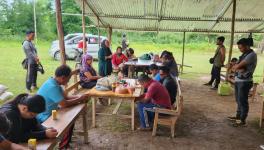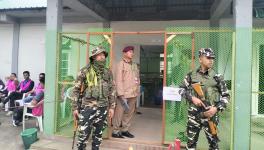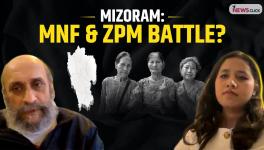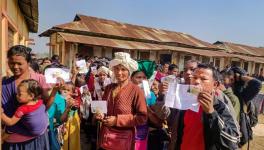Bru Refugees: Another Repatriation Failure?

The Mizoram Bru Refugees Displaced Forum (MBRDF) has been forced to reject the repatriation agreement signed on July 3, 2018. The MBRDF had signed a quadripartite agreement with the Government of India, and the governments of Mizoram and Tripura to enable the displaced Bru people to return to Mizoram. Financial assistance, healthcare and education had been provided for in the agreement. However, some of the Bru refugees, were disenchanted with the agreement as they wanted to have their long-standing demands for political autonomy fulfilled. On July 16, they gheraoed the head of the MBRDF, Apeto Sawibunga, as well as the Sub-Divisional Magistrate of Kanchanpur Sajal Biswas, the Sub-Divisional Police Officer Kiran Kumar and the Deputy Collector Animesh Debbarma. They forced Sawibunga to sign a letter rejecting the agreement which was countersigned by the other officials. So far, 60 people have been arrested in connection with this.
The Bru people inhabit an area consisting of parts of Mizoram, Tripura and the Chittagong Hill Tracts in Bangladesh. In Tripura, they are known as Reang, whereas the people inhabiting Mizoram prefer to be called Bru. The Bru are predominantly animist as opposed to the larger Christian Mizo population, or even the Buddhist Chakmas. They are not a part of the larger Mizo identity, and have thus formed one of the minority communities in the state. In 1997, the Bru National Union (BNU) passed a resolution demanding an Autonomous District Council (ADC) along the lines of the Chakma ADC. This demand was vociferously objected to by not just the Mizoram government, but also the powerful Young Mizos Association (Mizo Zirlai Pawl (MZP)).
It was just a matter of time for the well-known pattern to play out; a demand for political autonomy is rejected and then the hard-line elements within the movement launch an armed struggle. In 1997, the Bru National Liberation Front (BNLF) killed a Mizo forest guard in Mamit district. The killing received widespread condemnation among the Mizo people. Thus, soon after the ethnic riots took place, between 35,000 to 40,000 Bru villagers were forced to flee Mizoram and seek shelter in camps in Tripura.
The refugees have lived in the refugee camps in Tripura for over 20 years. In 2001, the BNLF and the government of Mizoram opened dialogue for the first time. By 2005, both parties arrived at an agreement which included the BNLF surrendering its arms and repatriation. However, in 2009, the deal fell through after Bru armed groups killed a Mizo youth. Following the violence, the MBRDF has emerged as the main group to represent the interests of the Bru refugees. However, after another decade, another deal seems to have fallen through.
In the present apparent failure, one question emerges: why was the deal rejected after being accepted? Senior journalist Sangeeta Barooah Pisharoty mentioned that the deal may have been rushed through, keeping in mind the upcoming Mizoram Legislative Assembly polls in December this year. This arises, as it has been reported that a clause in the agreement provides for the repatriated people to receive voter cards and have the voter rolls in the state updated. In April this year, Roluahpuia, an expert on the issue, in his article in the Economic and Political Weekly,mentioned that an organisation called the Bru Hindu Joint Coordination Committee (BHJCC) has been petitioning the Ministry of Home Affairs to protect the 'Hindu' Brus from the 'Christian' Mizos. They have also alleged that the Mizos have burned down temples in Mizoram. He also mentioned that the Vanvasi Kalyan Ashram has been active in the refugee camps in Tripura.
Also Read: Hindutva's Double Game in the Northeast
The pressure exerted on the MBRDF as well as the district officials by members of the Bru refugees, consisted of two main issues. The first being that there were no clauses to provide for the establishments of an ADC. The second being the rejection of the demand for cluster villages. With the MBRDF officially rejecting the agreement – albeit under duress – it appears that the governments involved are in a difficult position. Firstly, the government of Mizoram is eager to implement the agreement. The government of Tripura has been receiving funds from the Union Government for maintaining the people in the camps. Thus, if the Union Government decides to unilaterally implement the agreement, it is unlikely that it will be done so without the use of force. On the other hand, if the demand for an ADC is conceded, the Congress government in Mizoram which is already facing an anti-incumbency sentiment would feel the wrath of the MZP.
The issue of repatriating the Bru people is an unenviable task considering the strong ethnic dimension to the situation. The best possible outcome would actually be to accede their demands; however, political considerations seem to derail any attempt to do so.
Get the latest reports & analysis with people's perspective on Protests, movements & deep analytical videos, discussions of the current affairs in your Telegram app. Subscribe to NewsClick's Telegram channel & get Real-Time updates on stories, as they get published on our website.
























